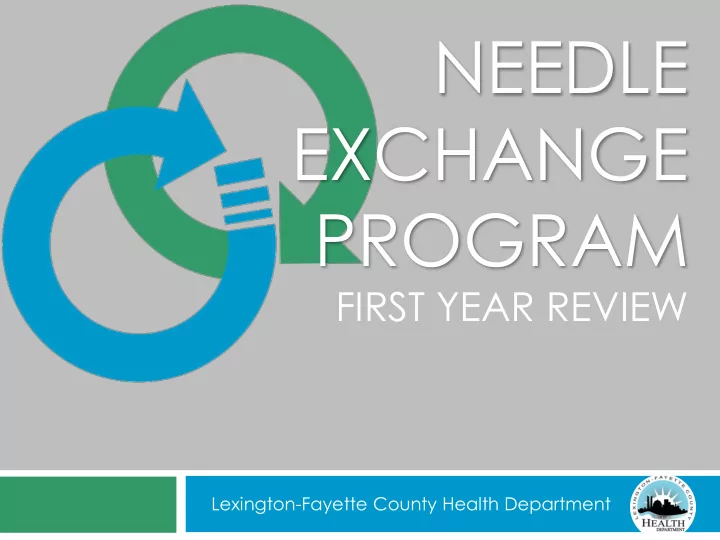

NEEDLE EXCHANGE PROGRAM FIRST YEAR REVIEW Lexington-Fayette County Health Department
WHAT IS A NEEDLE EXCHANGE? A public health program to reduce the negative health consequences of injection drug use. Senate Bill 192 (2015) allows local health departments to distribute clean needles to injection drug users in exchange for used needles. Needle exchange programs (NEPs) are proven to reduce the spread of HIV, Hepatitis C, and other blood-borne infections. Provides new, sterile syringes, and clean injection equipment. Provides safe disposal site for contaminated syringes. Operation of needle exchange program approved in Lexington by the Urban County Council on July 2, 2015, and by the Board of Health on July 13, 2015. 2
LEXINGTON’S NEEDLE EXCHANGE PROGRAM Open Fridays from 1:30-4:00 PM. Began operation on September 4, 2015. Clients bring in needles to receive needles. Staffed by six trained health department employees and a coordinator. Disease Intervention Specialists serve alongside trained staff to offer rapid HIV testing, results, and counseling. Other services offered include LFCHD clinic referral, educational materials, service referral information, bleach kits, and condoms. 3
Lexington-Fayette County Health Department REASONS FOR A NEEDLE EXCHANGE PROGRAM
PREVENTION OF AN OUTBREAK Injection drug use is the number one risk factor for hepatitis C and is a major risk factor for HIV. In 2013 and 2014, Kentucky ranked first in the nation in the rate of acute hepatitis C, according to the CDC. As of June 30, 2015, 900 people were identified as living with HIV in Fayette County.* Nationwide,1 in 5 people with HIV do not know they have it. In Kentucky, estimates are that a quarter to a third of people living with HIV do not know they have HIV.* *Kentucky HIV/AIDS Surveillance Report, December 2015 5
Kentucky hospitalizations for drug-dependent newborns increased from 19 in 2000 to 1,060 in 2014.* Average cost of treating one case of hepatitis C: $32,000-$56,000. Estimated average cost of lifetime HIV treatment, according to the CDC: $379,000. * Neonatal Abstinence Syndrome in Kentucky, Kentucky Department for Public Health, December 2015 6
LOCAL OVERDOSE DEATH TRENDS COMMUNITY IMPACT 2011 2012 2013 2014 2015 2016* Overdose deaths 52 63 81 108 137 95* Heroin-related 5 22 44 55 55 43* deaths Data provided by the Office of the Fayette County Coroner *Numbers reflect through August 10, 2016 7
Lexington-Fayette County Health Department NEEDLE EXCHANGE PROGRAM DATA September 2016
NEEDLE EXCHANGE SERVICES RECEIVED September 4, 2015 - August 26, 2016 1,002 TOTAL VISITS TO THE EXCHANGE by 376 INDIVIDUAL CLIENTS 9
GENDER OF CLIENTS IN THE NEEDLE EXCHANGE PROGRAM September 4, 2015 - August 26, 2016 39% Male Female 61% 10
AGE DISTRIBUTION OF NEEDLE EXCHANGE PROGRAM CLIENTS September 4, 2015 – August 26, 2016 53+ years 17-25 years 8% 11% 44-52 years 11% 26-34 years 40% 35-43 years 30% 11
PERCENTAGE OF NEEDLE EXCHANGE PROGRAM CLIENTS SERVED, BY REPORTED COUNTY OF RESIDENCE (n=267) May 6, 2016 - August 26, 2016 2.25% 32.58% Fayette County Other Unknown 65.17% *Please note, zip code data collection began May 6, 2016. 12
PERCENTAGE OF FAYETTE COUNTY CLIENTS AT THE NEEDLE EXCHANGE PROGRAM BY REPORTED ZIP CODE OF RESIDENCE May 6, 2016 - August 26, 2016 (n=174) 40507, 1.72% 40513, 0.57% 40502, 2.87% 40514, 2.87% 40509, 5.17% 40508, 22.99% 40503, 5.75% 40515, 5.75% 40517, 9.20% 40505, 17.82% 40511, 10.92% 40504, 14.37% 13
TOTAL NEEDLES RECEIVED & DISTRIBUTED Total Number of Needles Received Total Number of Needles Distributed September 4, 2015-August 26, 2016 September 4, 2015-August 26, 2016 20,199 21,693 Ratio of needles received to needles distributed: 0.93 : 1 14
MONTHLY VISITS TO NEEDLE EXCHANGE PROGRAM, BY NUMBER OF CLIENT VISITS September 4, 2015 - August 26, 2016 250 200 61% 150 100 68% 79% 50 58% 68% 86% 39% 61% 76% 61% 57% 18% 77% 32% 42% 82% 39% 32% 21% 39% 43% 24% 23% 14% 0 Sept Oct Nov Dec Jan Feb Mar Apr May Jun Jul Aug First Visit Repeat Visit 15
FUTURE PLANS
F FISCAL YEAR 2017 BUDGET NEEDLE EXCHANGE PROGRAM REVENUES: TAX APPROPRIATIONS 46,081 CONTRIBUTION & DONATIONS 900 TOTAL REVENUES 46,981 EXPENSES: SALARIES, BENEFITS, & INDIRECT COSTS 30,931 VARIOUS OPERATING COSTS (SUPPLIES, DISPOSAL, ETC.) 16,050 TOTAL EXPENSES 46,981 17
EXPANDED SERVICES: ON-SITE REFERRALS TO SUBSTANCE ABUSE TREATMENT On-site referrals to rehabilitation services are now available. Amy Baker, a Program Coordinator from the Department of Social Services Substance Abuse and Violence Intervention, began offering this service in April 2016. As of September 9, 2016, there have been six referrals. 18
EXPANDED SERVICES: NALOXONE (NARCAN) In partnership with the University of Kentucky, naloxone, an antidote for opioid overdoses, is available on-site for clients, beginning September 2, 2016, regardless of ability to pay. Under the direction of Dr. Daniel Wermeling, all clients are educated and trained by a licensed UK pharmacist before receiving naloxone kits. About 50 kits have been dispensed in the last two weeks. 19
EXPANDED SERVICES: NALOXONE (NARCAN) • Blocks opiate receptors. • Works in 1 to 3 minutes and lasts 30 to 90 minutes. • Upon administration, Emergency Medical Services must be called. • Can cause withdrawal symptoms such as nausea and vomiting, disorientation, etc… • No risk for abuse or addiction. 20
EXPANDED SERVICES: RAPID HEPATITIS C TESTING • Quick, on-site screening test using blood from a finger stick. • If positive, a follow-up visit to the public health clinic for a confirmatory test is required. • Plan to begin offering by the end of October 2016. 21
NEXT STEPS A workgroup has been developed to plan for the expansion of the LFCHD’s Needle Exchange Program. The group is evaluating existing data and exploring how to best expand hours and/or sites for the program. The group is exploring other data which might be collected and additional services which could be offered at the program. 22
QUESTIONS? For more information about the needle exchange program, call 859-288-2437 or email lfchd@ky.gov
Recommend
More recommend